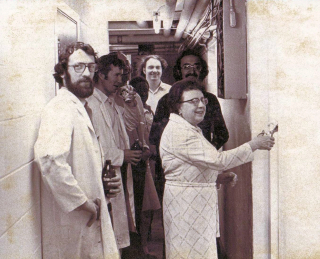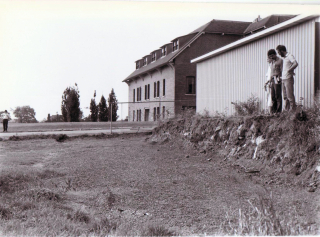
 The Institute of Parasitology has a long and distinguished history from when it first opened its doors in 1932, under the directorship of the renowned Canadian Parasitologist T.W.M. Cameron (pictured at right), to the cutting edge science by its graduate students and professors under the current director, Dr. Reza Salavati.
The Institute of Parasitology has a long and distinguished history from when it first opened its doors in 1932, under the directorship of the renowned Canadian Parasitologist T.W.M. Cameron (pictured at right), to the cutting edge science by its graduate students and professors under the current director, Dr. Reza Salavati.
The Institute has always had two functions: graduate teaching and research, which are intimately related. The history of parasitology research in Canada is mirrored in the evolution of research and vision of the 10 directors who had led the Institute over the past 90 years.
Research at the Institute of Parasitology centers upon how parasites interact with wild-life, domestic animals, and human hosts.
 In the early days, this research involved surveying the parasite fauna of Canada and determining the complex lifecycles of these organisms to gain a basic understanding of their structure and morphology. Later, in the 1960s and ‘70s, the focus was on understanding host-parasite interactions through the study of immunology, biochemistry, neurobiology and parasite ultrastructure. Leading into the 1980's, other areas came into play, such as how parasite behaviour influences host behaviour. In addition, the ‘80’s also heralded studies on the epidemiology of human parasitic infections and the dynamics of the host-parasite interplay at the population level.
In the early days, this research involved surveying the parasite fauna of Canada and determining the complex lifecycles of these organisms to gain a basic understanding of their structure and morphology. Later, in the 1960s and ‘70s, the focus was on understanding host-parasite interactions through the study of immunology, biochemistry, neurobiology and parasite ultrastructure. Leading into the 1980's, other areas came into play, such as how parasite behaviour influences host behaviour. In addition, the ‘80’s also heralded studies on the epidemiology of human parasitic infections and the dynamics of the host-parasite interplay at the population level.
 In the mid-1980s, there was an expansion of the Institute of Parasitology, with a new modern wing being added to the building with state-of-the-art facilities and the recruitment of new academic researchers. Molecular parasitology arrived at the Institute. During this latter period, there have been many exciting and innovative advances in molecular parasitology, both in the biology and treatment of human and veterinary diseases caused by parasites. Studies have focused on diseases such as malaria, leishmaniasis, filariasis and schistosomiasis. Advanced recent molecular studies have focused on areas such as the mechanisms of drug resistance and drug-receptor interactions and have investigated new drug delivery systems.
In the mid-1980s, there was an expansion of the Institute of Parasitology, with a new modern wing being added to the building with state-of-the-art facilities and the recruitment of new academic researchers. Molecular parasitology arrived at the Institute. During this latter period, there have been many exciting and innovative advances in molecular parasitology, both in the biology and treatment of human and veterinary diseases caused by parasites. Studies have focused on diseases such as malaria, leishmaniasis, filariasis and schistosomiasis. Advanced recent molecular studies have focused on areas such as the mechanisms of drug resistance and drug-receptor interactions and have investigated new drug delivery systems.
Teaching is an important mandate of the Institute of Parasitology, not only through mentorship of graduate students in their research, but also through the provision of an academically stimulating environment with regard to undergraduate courses, seminars and national and international meetings. The Institute of Parasitology has an international reputation with world-class researchers.
 Over the years, the Institute of Parasitology has reached out to the community. In the past it acted as the National Reference Center for Parasitology in Canada, providing a standard for the diagnosis of human parasitic infections for the Provincial Diagnostic Laboratories.
Over the years, the Institute of Parasitology has reached out to the community. In the past it acted as the National Reference Center for Parasitology in Canada, providing a standard for the diagnosis of human parasitic infections for the Provincial Diagnostic Laboratories.
More recently, it has taken the lead in bringing together researchers from institutions across Quebec with the formation of the FQRNT Centre for Host-Parasite Interactions (CHPI). This Centre fosters interactions between researchers, and brings supervisors and students together for an annual Quebec Molecular Parasitology Symposium.
As the host-parasite interaction is continually evolving, so too is the panacea of research at the Institute of Parasitology. One can only anticipate what the next 85 years will bring!

Author: Dr. James M Smith
Graduate Program Director and Faculty Lecture, 1984-2007
